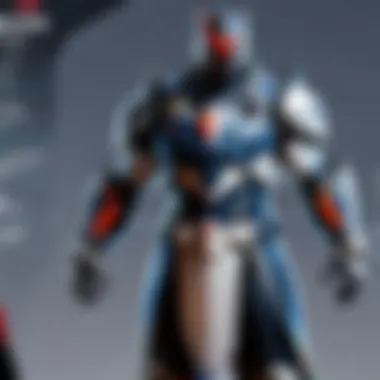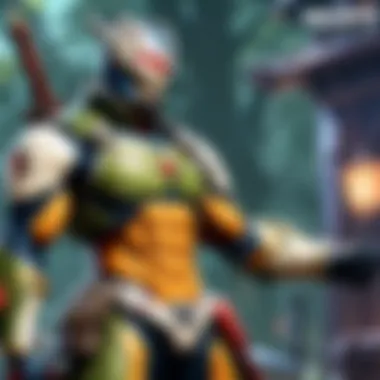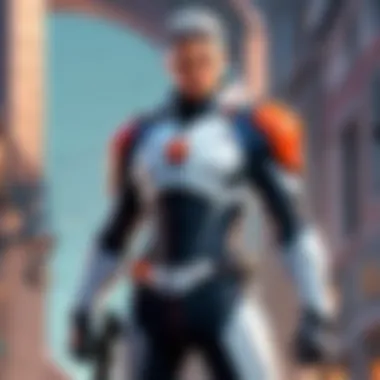Masters Week Schedule: Insights for Valorant Aficionados


Intro
Valorant has emerged as a prominent player in the esports arena, capturing the attention of casual gamers and competitive players alike. As the Masters Week approaches, understanding the nuances surrounding the schedule is imperative for enthusiasts.
This comprehensive guide delves into the Masters Week schedule, outlined for both players and fans. It breaks down events, timings, and competitive formats vital for celebrating this thrilling occasion in the gaming world. Below, we will explore key components that will mark this exciting week of Valorant gameplay, engaging viewers and participants at all levels.
Game Overview
Intro to Valorant
Launched by Riot Games in June 2020, Valorant offers a blend of first-person shooter elements combined with tactical gameplay. Players must rely on both exceptional mechanical skills and teamwork to secure victory.
Game mechanics and objectives
The primary objective encompasses eliminate the enemy team or complete objectives based on game mode. Currently, there are several modes, including Spike planted, Defuse, and others that enhance strategic diversity. The game's pinnacle revolves around mastering gunplay complemented by agent capabilities.
Brief history of the game
Valorant has significantly developed since its launch, undergoing numerous updates that keep the competitive scene fresh and engaging. Community feedback has played a key role in shaping gameplay elements across all playing levels.
List of playable agents and their unique abilities
Valorant features multiple agents, each contributing to a well-rounded team dynamic. These characters possess unique abilities impacting gameplay. Currently, warriors include:
- Jett: Agile and versatile, capable of quick movements.
- Sova: An intelligent scout, providing valuable intel.
- Sage: A healer with the ability to revive teammates and support the team in battle!
- Phoenix: Combat-oriented, wielding fire abilities for both offense and healing.
Each agent comes equipped with exciting powers to enhance team synergy. Understanding these traits is crucial ahead of Masters Week.
Strategy Guides
Tips for beginners
New players should focus on communication and map awareness. Team objectives should take precedence over individual gameplay; collaboration is essential in Valorant.
Advanced tactics for experienced players
Expert players should analyze enemy patterns, positioning, and strengths. As various strategies depend heavily on adapting to opponents, seasonal meta informs successful approaches. Recognizing map scenarios and least areas can provide critical advantages.
Map-specific strategies
Familiarizing one's self with all maps allows a deeper appreciation of strategic opportunities. Whether securing advantageous high grounds or coordinating rush tactics, each situation should alignteam around the objectives. Specific point assessments during tournament scenarios can make emphatic differences.
Agent-specific tactics and playstyles
Different agents lend themselves well to particular strategies. beispielsweise, aggressive plays may orient around characters like Jett or Phoenix, while defensive roles may favor a Sage or Cypher. Fluent understanding of agent character types enhances gameplay during Masters Week.
Patch Updates
Summary of recent game patches
Recent patches have adjusted gameplay on both agent balances and weapon statistics, inducing transformations in the competitive meta. Patch notes offer players insights into updates affecting potential effectiveness.
Analysis of changes to agents, weapons, and maps
On October 1st, significant changes in utility performance ensured players reflect on favored selections and available strategies. A balance shift following player feedback has heightened the dynamics within gameplay.
Community feedback on patch notes
Discussion sites, especially reddit.com, allow players to air opinions regarding game updates effectively. Prioritizing needs of the connected community furthers Riot Game's eventual decision.
Predictions for upcoming updates
Further alterations are anticipated. Analysts speculate on reworks coming due to underrepresented agents in competitive play.


Esports Coverage
Overview of recent Valorant esports events
Recent tournaments showcased diverse gameplay and players that may shape the ongoing Valorant meta. Valorant Champions turned heads and brought excitement concerning the competitive context.
Tournament predictions and analysis
Masters Week pushes both skilled teams and upcoming competitors to rival one another, heating the competitive major ecosystem. Players notch against former legends who have left deep imprints.
Insights on current professional meta
The evolving professional-meta makes ancient tactics stale, emphasis on necessitate strategy reworks.
Player Community
Featured player highlights
Showcasing elite talents enhance the community narrative. Exceptional friction showcased underscoring developing character within rise encourages pushing talent through fan-driven narratives. Reach analysis amongst casual players often rises amidst showcases like covered tournaments.
Community-created content showcase
Several player contributions allow fans experiences shaped through both unique opinions sharing and potential support. Talents expressed creatively build unique art, streamed experiences from latent engagement highlight community growth beyond response.
Forum spotlight on trending topics
Analyzing current forum discussions can divulge critical answers about tips and workarounds in gameplay. Insights governing aspects constitutes dynamics explored lingering tactics.
Overview of Masters Week
Masters Week holds a significant role within the Valorant competitive calendar. It encapsulates a series of events that provide high-stakes action, not just for players but also for fans and organizations. Each year, teams around the world compete to earn recognition and success in this highly anticipated event. A thorough understanding of Masters Week helps both players and community members appreciate its depth and impact.
Definition of Masters Week
The term "Masters Week" refers to a scheduled competitive event in the Valorant esports scene where a selection of top teams face off in a series of matches. Hosted at various venues around the globe, this week-long event showcases the best of Valorant gameplay, featuring talented players from different regions competing for glory and higher ranks in the Valorant Championship Tour. The structure typically involves group stages followed by knockout rounds, culminating in a grand final that distinguishes the ultimate champion.
Importance to the Valorant Community
Masters Week is not merely a competition; it functions as a celebration of the Valorant community. This event brings together players, fans, and content creators in a shared enthusiasm for the game. Key points of its importance include:
- Skill Showcase: Players demonstrate their exceptional abilities and game strategies. This inspires upcoming talents and pushes current players to enhance their skills.
- Community Building: Fans engage with one another, forming bonds over gaming experiences and supporting their favorite teams.
- Esports Growth: As one of the more significant events in the tournament progression, it raises awareness and profiles for the sport, contributing to its expansion.
"The Masters Week not just unifies fans around their teams, but it also sets the stage for emerging competitive talent in the Valorant community."
In summary, understanding the nature and relevance of Masters Week enables players and enthusiasts to appreciate the intricacies and excitement of professional Valorant matches even more.
Event Schedule Breakdown
The Event Schedule Breakdown serves as a critical section of this article. It not only serves to inform followers about the timely conduct of events but also shapes their viewing experience and competitive strategies. A well-structured schedule enhances anticipation and engagement within the Valorant community. Understanding the event timing and formats offers insight into what to expect. This leads to a deeper appreciation of the competitive dynamics and allows gamers to plan their viewing accordingly.
Daily Event Timings
Each day’s events follow a specific timetable that hinges on the overall format of the Masters Week. Events are staggered throughout the day to accommodate viewers across multiple time zones.
- Starting Times: Typically begin in the early afternoon and continue until night. This central timing aids in maximizing audience attendance. Different matches may commence at varied intervals, ensuring a rich viewership layer spanning the day.
- Duration: Most segments last around two to three hours, encouraging relay of content without causing viewer fatigue. Several timetables adjust as matches progress due to upsets and unforeseen delays.
By aligning viewers’ communities on shared schedules, expectations are kept realistics.
Format of Events
This year’s Masters Week employs a unique format designed to entice both casual viewers and competitive players. The variety of formats serves to intensify interest. Here are key aspects of the event formatting that unify their competitive essence:
- Group Stage: This foundational tier enables teams to compete against a range of opponents. Sometimes it includes round-robin formats where each team faces each other. This guarantees exposure to all contested styles, thus enriching gameplay narratives.
- Elimination Rounds: Following group stages, teams proceed to a knockout phase. The stakes are higher here, as one loss results in elimination, cultivating both tension and strategy. This setup codifies every match's importance, urging teams to showcase their best skills.


Strategic viewing is vital in this section; understanding the format can offer valuable determinations for fans.
Key Matches to Watch
Within Masters Week, a selection of pivotal matches emerges, representing crucial clashes between some top-tier teams. Here are notable bouts to do not miss:
- Team A vs. Team B: As top contenders, this match showcases advanced skills of players. Tactical insights and intricate team dynamics will be on full display.
- Team C vs. Team D: Here, long-time rivals will face off, building on past encounters that lend genuine excitement. Fans love legendary match-ups, with an innate sense of historical narratives.
- Final Showdown: This match acts as a grand finale, encapsulating the progression of strategyability and skill throughout the tournament. This culmination not only rewards the victors but ignites future rivalries. Intent observers find these contests the heart of the event.
The exploration of key matches revitalizes engagement with heralded teams, establishing tighter community connections.
By dissecting event timings, formats, and essential matches, viewers and players can fully appreciate the assembled spectacle. These elements extend beyond mere games; they represent a holistic journey through a week of competitive legends, helping define their footings in the eSports landscape.
Participating Teams
Participating teams are a crucial part of Masters Week, as they shape the engagement and competitive spirit of the event. These teams symbolize aspiration and effort, refining the competitive environment that valorizes skill and tactical awareness in Valorant. Understanding the compositions, unique strategies, and rankings of these teams will greatly benefit viewers and potential competitors. The narratives involving these teams can also stimulate discussions and analysis, enriching the viewing experience for all involved.
Overview of Teams
In the Masters Week, teams are selected based on their merits throughout the competitive season. Each team usually comprises five players and a coach, actively working together to maximize teamwork and synergy. Some of the noteworthy teams participating this year include:
- Sentinels: Known for their strategic brilliance and tactical plays.
- G2 Esports: Their dynamic roster often brings fresh strategies to the table.
- Fnatic: A legacy team with a reputation for consistency and innovation in gameplay.
- OpTic Gaming: Known for their adaptation to the meta and innovative plays.
These teams also develop particular styles and strategies over time, reflecting the strengths and weaknesses of their rosters. Followers of the scene will appreciate the contrasts in how these teams approach the game.
Team Rankings and Seeds
Team rankings are important as they often determine matchups in the brackets during Masters Week. Each team is seeded based on their performance in prior tournaments and the Valorant Champions Tour leaderboard. This year, the rankings lead to some anticipated clashes as higher-seeded teams may meet underdogs looking to upset the status quo. The seedings impact:
- Expectations: Fans have certain expectations from top-ranked teams to perform successfully.
- Match Dynamics: Higher seeds often besides the first picks in retrospections, limiting strategy for lower seeds.
- Viewer Engagement: Close matchups between seeded teams tend to attract more attention and enhance viewership.
Player Highlights
The players of these teams can make or break a match. Each event sees specific players rise to critical prominence, often making spectacular plays that turn tides. Some notable players who could shine in the Masters Week include:
- TenZ (Sentinels) is acclaimed for his sharpshooting ability and game sense.
- Nivera (G2 Esports) displays extraordinary adaptability in various scenarios, affecting his team's strategies profoundly.
- Derke (Fnatic) holds a player profile that transforms the path for his team in tight situations.
- FNS (OpTic Gaming) often brings leadership and tactical insights essential for his team's survival in rigorous matches.
Showcasing these highlights can deepen the audience's appreciation of individual contributions to team success, emphasizing the importance of each player's decisions and performances.
Gameplay Dynamics
Understanding the gameplay dynamics in a competitive setting like Masters Week is crucial. It highlights how teams adapt their play styles and decision-making processes under pressure. Knowledge of these dynamics allows players and fans to better appreciate the intensity of matches. Dynamics inform strategies that each team might employ, as well as broader trends that define metagames.
Strategies to Expect
With the competition elevating in these high-stakes matches, strategies generally shape up based on detailed preparations made before the event. You can expect a mixed bag of aggressive and defensive tactics, depending on the opposition.
- Map Control: Upholding control on important maps is key. Teams utilize agents to hold advantageous positions, disrupting enemy movement. This often leads to securing advantageous fights.
- Smokes and Utility: Teams pay careful attention to their agent compositions. Utility placements are designed to conceal movements or block enemy site entry.
- Listening to Sound Cues: In competitive play, players adapt by focusing on sound. Teams may utilize headphones strategically to ensure that they catch even the faintest cues for positioning.
Expect these tactics to develop in real-time as players face off against their opponents. The element of surprise often plays an important role in shifting the game's momentum.
Meta Analysis
Another pivotal aspect of gameplay dynamics is the ever-evolving meta. The meta comprises the prevailing strategies and agent selections that dominate the competitive scene at any given time. During Masters Week, analyzing the meta gain significance as it can drive both expectations and outcomes.
- Agent Performance: Insights into agent effectiveness can influence team compositions significantly. Determining the strength of popular agents like Jett and Sage forms the bedrock for sound drafting and preparation.
- Counterplaying Tactics: Teams may adapt newer counters to mainstream plays. For example, if double-duelist compositions are on the rise, teams might lean towards controllers, or initiate saving strategies.
- Patch Effects: Changes in game patches can reshape the dynamics instantly. Players often review patch notes in advance and adjust their strategies accordingly.
Following the shifts in the meta during Masters Week becomes essential. Competitive instinct often reminds players that to stay ahead, they need a balanced grasp on evolving game mechanics.
Potential Upsets
The nature of competitive gaming is unpredictable. At Masters Week, potential upsets serve as talking points for fans and analysts alike. Undefined match beats all expectations might see underdog teams striking against reigning champions.
Common indicators include:


- Team Form: Teams arriving at the event with good momentum may face off successfully against others, stressing form continuity.
- Rookie Talent: Upcoming players can become game-changers, altering dynamics profoundly, especially when their detailed preparation disrupt existing strategies based on preconceived behaviors from known players.
- Posting Preparations: If a favored team misjudges their opponent due to lack of scouting, the stage is set for a surprise defeat.
In competitive tournaments, one should never underestimate any team. A risk taken during gameplay can bring unrivaled results.
Broadcast and Coverage
The concept of broadcast and coverage plays a critical role during Masters Week, serving as a lifeline between the competitive scene and the fanbase. More than just a means of distributing the event, it encapsulates how experiences are delivered. Viewers rely heavily on the quality of broadcast and coverage to fully grasp the scope and excitement of the matches.
Streaming Platforms
Streaming platforms act as the stage upon which the drama of Masters Week unfolds. They go beyond merely conveying visuals; they shape the viewer's experience in real-time. Twitch, YouTube Gaming, and Facebook Gaming are some of the most prominent platforms in this realm. Types of content often extend from live match coverage to replays, commentary segments, and player interviews. Each platform tailors their interfaces to fit the needs of diverse audiences, thus amplifying the reach of the Masters Week events.
Furthermore, interactive features on these platforms enable viewers not only to observe but also engage with the broadcasts. Viewers can participate via chats, sharing thoughts or strategizing discussions in this space. Thus, the platform you choose can enhance or detract from your observational experience. Remember, choosing the right streaming platform may seem trivial, but each offers unique charms and disadvantages. Insights from one may not mirror another
Commentary and Analysis
The quality of commentary and analysis during Masters Week is instrumental in shaping viewers' understanding and enjoyment of the event. Renowned commentators often accompany the match coverage. Analyzing plays, dissecting strategies and shedding light on character choices can dramatically enhance how the gameplay resonates with the audience.
Some commentators become notable personalities within the gaming community, their personal styles making the commentary both enjoyable and informative. Types of analysis can include tactical breakdowns and statistical evaluations that inform viewers about players’ performances and team strategies.
Moreover, having expert analysts contribute further disperses important insights. These analysts help in unpacking both the glamorous highlight plays and the minute tactical choices that define high-level play.
Viewers gain a deeper perception of the matches when high-level analysis is paired with real-time gameplay feedback. It opens up a dialogue, making it clear that understanding the sport involves complexity—a notion communicated clearly through proper commentary.
The combination of quality broadcasts and informative commentary builds a robust backdrop for Masters Week, appreciation is enhanced as fans better understand the rhythms and nuances of the game.
Community Engagement
Community engagement during Masters Week goes beyond mere viewership. It encompasses collective experiences, shared passions, and a sense of belonging among fans and players. For current fans or those new to or valorant esports scene, understanding why this engagement matters can enhance their overall experience and connection to the game.
Engaging communities around Masters Week serves several vital purposes. First, these engagements foster a sense of camaraderie among players and fans. Participants directly influence the event's atmosphere. They celebrate their favorite teams, creating electric environments at viewing parties and online threads. The shared reactions to key plays or unexpected outcomes strengthen these communal ties.
Viewing parties are another critical facet of community engagement. These gatherings allow spectators to watch matches together, building a more vivid experience. The atmosphere can be exhilarating during intense game moments. Wear your favorite team jersey, grab snacks, and connect with like-minded individuals.
Meanwhile, social media trends amplify excitement around the event. Discussions on platforms like Reddit and Facebook provide timely updates, insights, and debates about matches and player performance. Social media buzz forms connections—fans celebrate or critique results in real-time. Following major teams and players—like Sentinels or LOUD—on these platforms enables fans to stay informed about news in the world of competitive play. Curated hashtag campaigns further generate awareness and enthusiasm.
Community engagement during Masters Week is not just about watching; it thrives on how fans connect with each other.
Being actively engaged offers benefits as well. Viewers who take part in comments or discussions feel more invested. Their opinions matter, and they can find a sense of validation by sharing thoughts and witnessing various reactions. By aggregating diverse perspectives, fans notably enrich intellectual discussions.
Ultimately, the journey of engagement enhances the experience of spectators. Whether through excitement at local viewing gatherings or lively digital discussions on social media, the experience of Masters Week leaves an indelible mark on participants and creates lasting memories for the Valorant community.
Post-Event Analysis
Post-event analysis holds a significant place in understanding the dynamics of Masters Week in Valorant. This section emphasizes the lessons learned and insights generated from the recent tournaments. By examining what transpired, players, analysts, and fans alike can derive valuable conclusions that affect overall gameplay strategies.
Anticipation surrounds performance reviews and individual player assessments. As matches conclude, discussions about outstanding performances and missed opportunities arise. This serves not just as a retrospective on gameplay but also sets the groundwork for future improvements in preparation and strategy.
The importance of a structured analysis cannot be overstated because it offers understanding not only for competitors but also for their supporters. Evaluating game footage along with player decisions promotes a growth mindset, encouraging teams to refine their approaches based on tangible outcomes. Ultimately, post-event analysis fosters a culture of constant improvement, aligning well with the competitive nature of Valorant esports.
Key Takeaways
After observing and analyzing all the events during Masters Week, there are critical takeaways that players and coaches need to note:
- Event Performance: Teams that excelled showed prowess in communication and collaboration.
- Meta Evolution: Specific strategies and use of agents have shifted, forming the basis for future play.
- Player Growth: Individual players showcased growth in mechanics that may influence rosters.
- Data Utilization: Teams that leveraged data analysis on gameplay trends were often better equipped than opponents.
In summary, key takeaways clarify the advancements and loses faced by teams, providing a practical framework for moving forward. Collectively, this establishes immediate adaptation opportunities for upcoming tournaments.
Impact on Future Competitions
Understanding the outcomes of Masters Week extends beyond immediate events; it molds the landscape of future competitions.
Here are several points that underline its impact:
- Shifts in Strategy: Analysis could lead to significant changes in how strategies are planned for upcoming competitions. Lessons learned regarding agent performance trends can redefine approaches Right preprocessing and adapting are all significant during competitive scenarios.
- Seeding and Rankings: The performances impact seeding within tournaments. Better performers gain not only prestige but also advantageous positions in future contests, affecting their route in competitions.
- Rivalry Dynamics: The contests can alter team rivalries, shaping narratives for fans that keep engagement high. Persistent match-ups change the feel and environment around events.
- Preparing New Talent: Findings from replays and analysis can inform younger players' development, fostering their cultivation within the competitive scene. Enhancements to training regimens can influence the new tournaments’ scenic routes.
Across all fronts, Masters Week conclusions shape future gameplay norms, demand adaptive thinking, and ignite fresh talent.
Post-event analysis is essential for understanding the present, anticipating the future, and making informed decisions in competitive Valorant.



